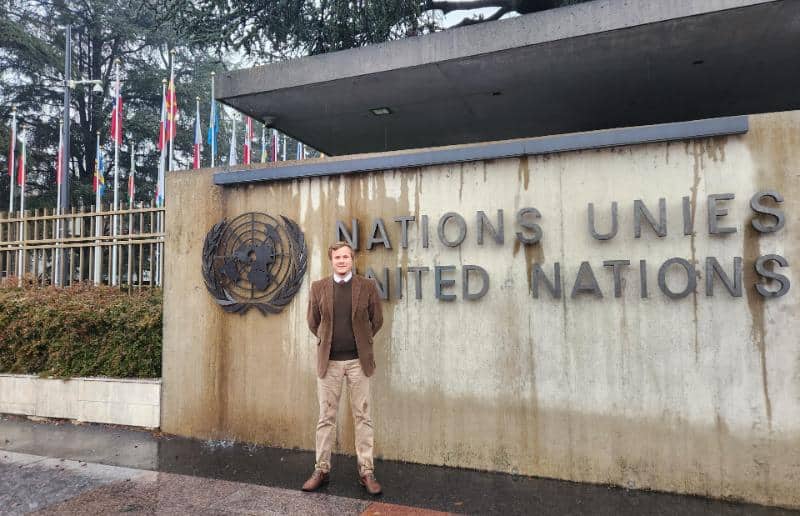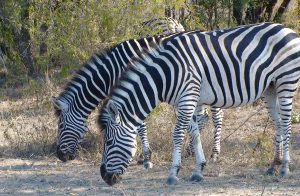AfriForum at the UN: Breakthroughs, insights and perspective
By Ernst van Zyl
In 2023, AfriForum continued its international awareness campaign at the United Nations (UN). Just like our 2022 visit to the UN, this was a multifaceted and multipurpose campaign.
The UN Committee on the Elimination of Racial Discrimination (CERD)
AfriForum’s campaign kicked off through our participation in CERD’s review process of the state of racial discrimination in South Africa. The South African government appeared before CERD for a quadrennial evaluation of its record in combating discrimination.
AfriForum submitted a report to CERD in 2022, after which we were invited to submit an additional follow-up report in 2023. Our 2022 report documented in detail several of the worst examples of racial discrimination against minorities since 2020. This included cases of racial discrimination by the government as well as cases by others due to government pressure, as well as hate speech against minorities, such as “Kill the Boer”. In our 2023 report, we specifically focused on the more than 116 race-based laws enacted by the South African government since 1994. The submission of the 2023 report was also accompanied by an opportunity to make an oral presentation before this UN committee. Information from both AfriForum’s reports and my presentation was used during the review process by CERD to question the South African government.
I used the presentation opportunity to supply more examples of discrimination, such as the Dis-Chem memo that announced a moratorium on the employment and promotion of white people. Solidarity also handed in a report and made a presentation, so fortunately, I was not the only Afrikaner at CERD’s headquarters in Geneva. AfriForum and Solidarity also participated in a question-and-answer session with the committee members, during which we provided more details regarding our submissions.
Next, the CERD committee members questioned the South African government delegation, led by the Minister of Justice and Correctional Services, Ronald Lamola.
The impact AfriForum and Solidarity made at the forum was first reflected in the questions CERD asked about racial quotas in sport, as detailed in my presentation. In response, Minister Lamola falsely claimed that the government had “abolished” racial quotas in sport.
Régine Esseneme, a CERD committee member, questioned the South African government’s delegation about farm murders, hate speech inciting farm attacks, Julius Malema’s farm murders denialism, and what they are doing to address these issues. Esseneme expressly referred to the brutal murder of Brendin Horner as an example.
As usual, Lamola insisted that farm murders are ordinary violent crimes and cited inequality as a driving force. He further denied that farmers in South Africa are being targeted and tried to change the subject to farm workers being mistreated by their employers. Mxolisi Nkosi, the ambassador and permanent South African representative at the United Nations in Geneva, echoed Lamola’s narratives.
Esseneme labelled the South African delegation’s answers as “vague” and added that a report submitted to CERD (AfriForum’s 2022 report) documented at least two cases of farm murders directly related to the “Kill the Boer” chant. She requested the government to provide CERD with more details about these cases and the prosecution of farm murderers. Lamola agreed to do so.
With AfriForum’s 2022 CERD report in hand, committee member Y.K.J. Yeung Sik Yuen requested the South African delegation to provide details on the progress of the court cases against Malema and the EFF regarding the “Kill the Boer” chant. Lamola said the Equality Court ruled that this chant does not constitute hate speech but that an appeal case (by AfriForum) is pending.
AfriForum made various breakthroughs through our participation in these CERD sessions. One of the most noteworthy is that the thorny issues of farm murders and “Kill the Boer” were officially discussed for the first time by a UN committee and that our government was confronted with these issues at this level. Additionally, the government delegation’s answers revealed that the ANC has no solutions to the country’s most serious problems. Their strategy mainly comprises the formulation of desperate excuses. It was impossible for the government’s representatives to disguise their despondency and self-doubt. As an AfriForum representative who formulates solutions with my colleagues every week and contributes to their practical implementation, I was relieved that my fate is not in the hands of these defeated, planless and overwhelmed cadres.
AfriForum’s and Solidarity’s philosophy revolves around building and searching for practical solutions, while the ANC’s approach revolves around searching for excuses and blaming others for their failures. This glaring contrast between the two was once again highlighted. One side fights to own and expand its responsibilities, while the other fights to deny or outsource its responsibilities.
The UN Forum on Minority Issues
AfriForum’s successful participation in the CERD component of our UN campaign was followed by our participation in the annual UN Forum for Minority Issues. This year, our presentation was second on the list of many participants from all over the world. In my presentation, I particularly focused on farm murders, the “Kill the Boer” chant, and the government’s long and growing list of race-based legislation. Among the examples of racial discrimination I mentioned were the government’s plans to exclude farmers from tariff-free exports to the European Union and the United Kingdom if their farms were deemed too white and the Department of Water and Sanitation’s use of racial criteria as a condition for acquiring water use licences.
My presentation provoked great interest among representatives at the Forum. After my presentation, I shared our report on racial legislation and my contact details with those interested. A people cannot afford to be an island. All peoples need friends, especially in a hostile environment. On this visit, AfriForum met several friends of the Afrikaners.
Conclusion
This visit to the United Nations made me realise again how important it is to understand that our fate is not in the hands of the UN or the ANC. Our plans and actions will determine our destiny. However, AfriForum’s international campaigns bear much fruit. Any fight for freedom must be fought on many fronts. Every new community action, ally, recognition, presentation, neighbourhood watch, building project, and institution is a stone fitting into the mountain pass we are building for ourselves on our way to freedom and existential security. J.D. Kestell rightly pointed out that “A nation (volk) saves itself!”
Ernst van Zyl is the Head of Public Relations at AfriForum and the director of the documentary Selfbestuur. Ernst obtained a Master’s degree (cum laude) in Political Science at Stellenbosch University. He is a co-presenter of the Podlitiek podcast, hosts the Afrikaans podcast In alle Ernst, and has a channel for political commentary and interviews on YouTube. Ernst usually publishes contributions on X (previously known as Twitter) and YouTube under his pseudonym, Conscious Caracal.




















